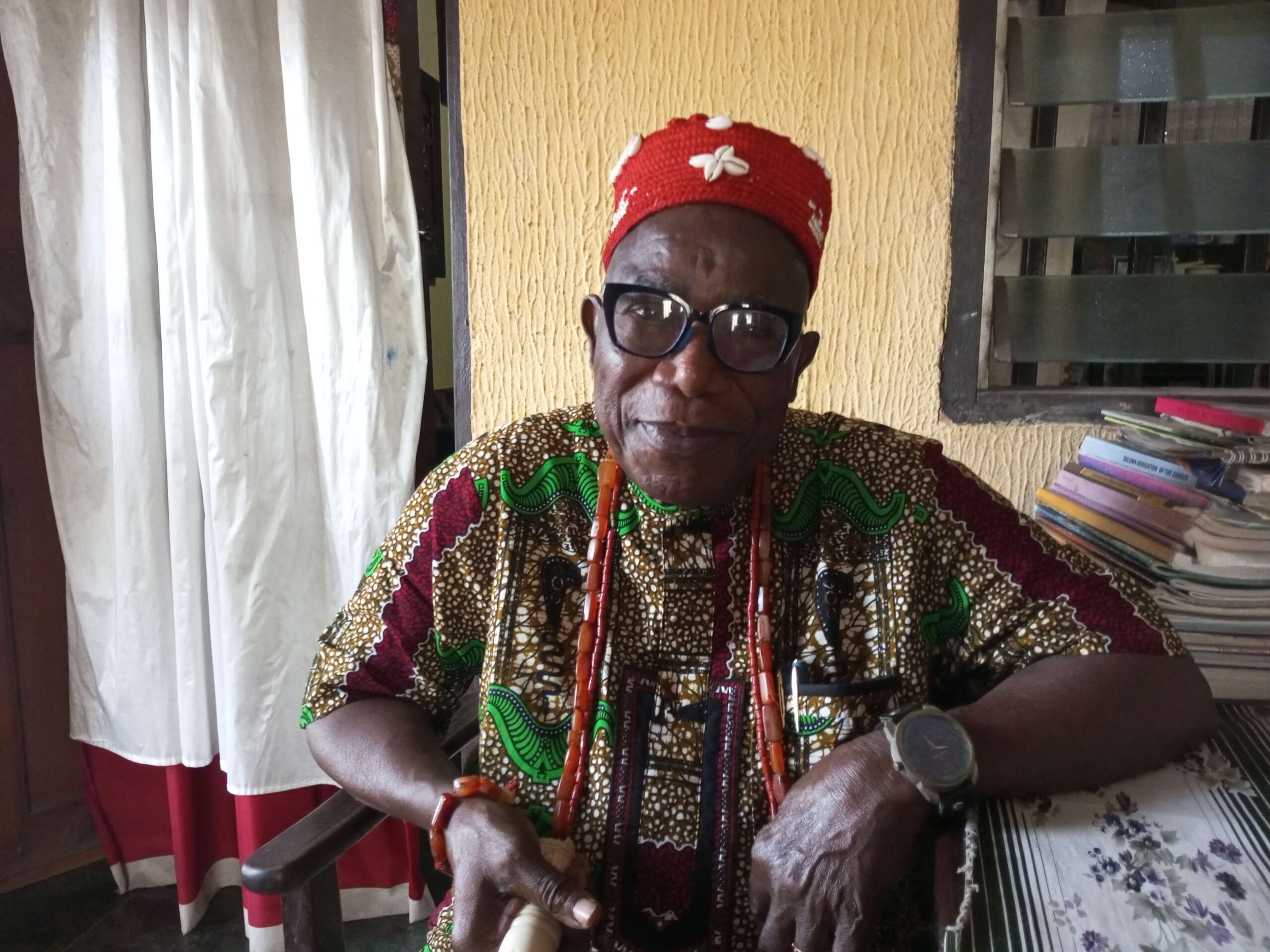ONITSHA, ANAMBRA: A daughter cannot inherit her late father’s property, so says a long-standing tradition that punishes people for being women or girls in several parts of Nigeria, especially in the southeast region.
“Ndigbo [the Igbo tribe] believe that the female children will be married out. It is rather unfair to give the women inheritance in their fathers’ houses [while they also gain] in their husbands’ places,” Joe Nwegwu, the traditional prime minister (Onowu) of Ebenebe community in Anambra, where the practice is commonplace, defended the culture.
When a man dies without having a male child, his brothers seize and inherit all his properties and wealth, leaving his widow and daughters with just a roof over their heads and nothing substantial for their livelihood. And brothers do the same to their sisters after their father’s death.
“When my father died, my [two] brothers, without our [five sisters’] knowledge, sold his properties in Onitsha,” said 51-year-old Hope Okoye, whose father died in 2007, leaving behind a litany of real estate properties in his hometown (Nibo) and Onitsha, one of the southeast’s biggest commercial cities.
“You watch your brothers’ families riding flashy cars and living in multi-million naira edifices all from the inheritance while you sweat it out to survive with your husband and children,” explained Rachael Princewill, a mother in her forties and a victim of disinheritance. “The effect is huge and deep, particularly if the girls get married to men that are not well-to-do.”
The custom is jealousy protected by the traditional patriarchal institutions against existing legal frameworks prohibiting the practice.
“Women are disinherited by their sons. Brothers disinherit sisters. Sisters-in-law disinherit their brothers’ wives. Unfortunately, some perpetrators of disinheritance are educated. Many village heads are equally complicit,” decried Amaka Ikedimma, programme officer of the Anambra State chapter of the International Federation of Women Lawyers or FIDA
What the law says
Relevant sections of federal and Anambra State laws forbid cultural and traditional expressions that deny citizens their right to own properties and inheritance based on gender.
The offence section of the Anambra State Widowhood Law (2005) states that a widow or widower shall not be forcefully dispossessed of any property acquired or used by the couple during the deceased spouse’s lifetime.
The Violence Against Persons Prohibition Law (2017) of Anambra State prescribes a maximum of four-year imprisonment or a fine not exceeding N400,000 or both for anyone who visits harmful traditional practices on another.
Section 12 of the Child Rights Law of 2004 forbids subjecting a child to discrimination based on community or ethnic group, place of origin, sex, religion or political opinion.
And section 41 (i) of the Nigerian constitution says, “No Nigerian shall be subjected either expressly by, or in the practical application of, any law in force in Nigeria or any executive or administrative action solely on the grounds of their “community, ethnic group, place of origin, sex, religion or political opinion”.
Though there are legal precedents established upon these legal frameworks and enough to discourage the practice of disinheritance (including in the Supreme Court’s ruling of 2014 that says “any custom that denies women, particularly widows, their inheritance, is repugnant to natural justice, equity and good conscience” and an Akwa Ibom high court ruling in March 2021 that says the practice is “anachronistic, primitive and unconscionable”), it has continued in most parts of the southeast and Niger Delta regions.
While women are mostly the victims of the practice, little boys are also affected because the culture also says when a man dies when his son(s) is a minor, his uncles or aunties (not his mother or sisters) should take possession of his properties in custody and hand them over to him only when he comes of age. But most times, the child never gets it.
FIDA tries to help
Over the years, FIDA has tried to protect vulnerable victims by promoting equality and educating citizens on the legal rights of women and children to inheritance in the southeast region and elsewhere.
FIDA tries to use alternative dispute resolution methods to settle cases. But where necessary and in cases where the perpetrator would not shift grounds, it provides free legal services to victims willing to take legal actions to reclaim their inheritance.
“We have always received such cases. Between December 2021 and September 2022, we recorded 57 cases. The victims are sometimes teenage boys or even grown-up men whose relatives take away their fathers’ property, especially when they think they don’t know about such property,” Ikedinma said.
“We have carried out different activities to educate women from various communities, including Ukpor, Aguleri, Umuleri, Awka and Nkpor. Others are Ogidi, Nnewi and Amaokpala. We sensitised them about disinheritance, widowhood and widowerhood and the contents of the Violence against Persons Prohibition Law. We also organised training for magistrates, judges, police, and paramilitary members on this inheritance issue. We’ve also had dialogue sessions with women from diverse communities and market sensitisation to educate traders who are mostly women.”
She said FIDA also has a weekly radio programme on Kpakpando FM in Anambra. A FIDA team member appears on the show to educate the audience on disinheritance and other harmful practices.
With the advocacy, some communities are finding ways to settle cases and ensure widows are not denied their rights, though they insist daughters cannot inherit their father’s properties.
“While female children do not have access to their fathers’ estates in our culture, disinheriting widows is not our culture. The widows should report such violations to the family. The family reports to the traditional institution, which contacts the traditional institution in the husband’s community and sorts it out,” explained Nwegwu, the Ebenebe traditional prime minister.
Fear of the spiritual
Fear remains one of several reasons the harmful practice has continued in most communities in Anambra and most parts of the southeast.
“People [including victims] have a lot of respect for tradition. They fear the gods [because they are told the gods will punish them if they go to court against tradition], reprisal from youths, stigmatisation, ostracism, et cetera. Consequently, they don’t fight for their rights,” Obinna Maduforo, Anambra State’s National Human Rights Commission coordinator, told Prime Progress.
Some victims sometimes take the initial legal step to claim their inheritance but withdraw the case midway for fear.
“Out of 57 cases, we succeeded in resolving only seven,” said FIDA’s Ikedinma. “We have just two or three concluded at the customary court. Up to 8% of the cases are ongoing at customary and magistrate courts. Those not ongoing have been abandoned. I know a lot of matters we started, and the victims withdrew interest.”
Other times, the cases are delayed or abandoned due to frustrating deliberate actions from the offenders and slow justice administration in the country.
“After several attempts to invite the alleged perpetrators to the FIDA centre, some will turn down our invitations. Sometimes when both parties are present, in the course of exploring alternative dispute resolution, one or both of the parties would storm out of our office and proceed to sue in court,” Ikedinma said.
Even the government worries that people sometimes do not speak up due to blackmail.
“The government is equally concerned,” said Ify Obinabo, the Anambra State Commissioner for Women Affairs. “In most families, women are the pillars of care and support to their parents and siblings even after they have been married out. It doesn’t make sense to disinherit them.”
While the battle rages between the culture and the law, the commissioner advises parents to protect the interest of their daughters while they are still alive by sharing “their property to their boys and girls before they die and make sure that everyone is aware of it”.
This story was produced with the support of Nigeria Health Watch through the Solutions Journalism Network, a nonprofit organisation dedicated to rigorous and compelling reporting about responses to social problems.
A long-standing tradition in parts of Nigeria, particularly in the southeast, denies women the right to inherit their late father's properties. This patriarchal practice often leaves widows and daughters economically vulnerable, as male relatives seize the deceased's assets.
Despite the existence of laws in Anambra State and Nigeria aimed at prohibiting gender-based disinheritance, the practice persists due to societal norms and fear of cultural repercussions. The Anambra State Widowhood Law, the Violence Against Persons Prohibition Law, and the Nigerian Constitution all provide legal frameworks to protect women's inheritance rights. However, adherence to these laws is weak.
The International Federation of Women Lawyers (FIDA) works to promote equality and educate citizens on the legal rights of women and children to inheritance. They offer alternative dispute resolution methods and free legal services to victims. Nonetheless, societal pressures and fear of spiritual and social reprisal often hinder women from claiming their rights.
Efforts by FIDA and other organizations have led to some progress, including education campaigns in various communities and training for legal and law enforcement professionals. Despite these efforts, only a fraction of disinheritance cases see successful resolutions.
The Anambra State government is also concerned about the issue and encourages parents to divide their property equally among their children while they are still alive to prevent future disputes. The battle between cultural practices and legal rights continues, highlighting the need for ongoing advocacy and education.






